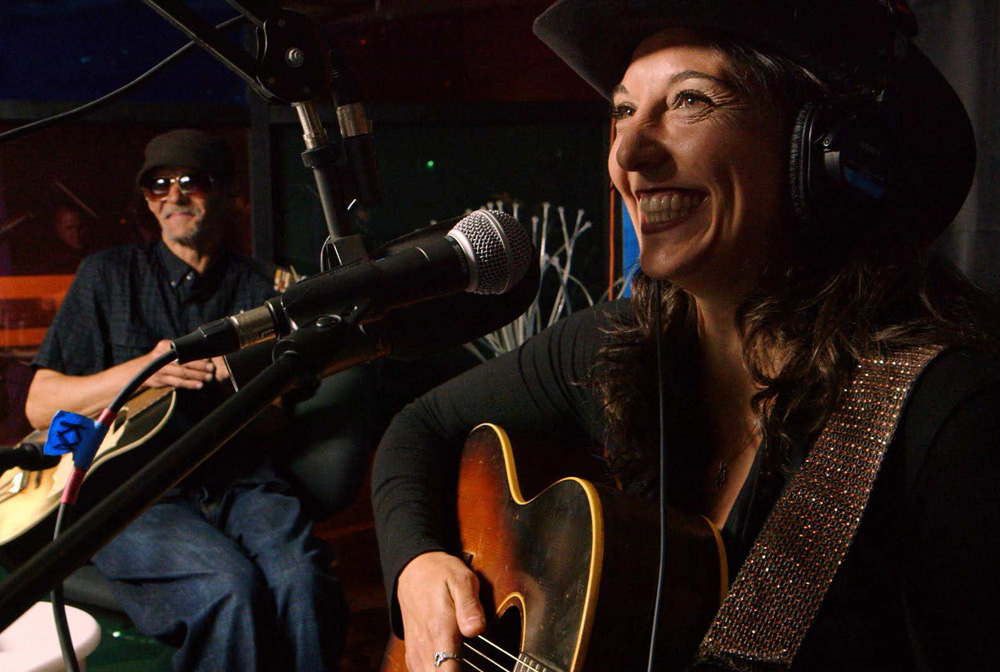For a story where words might not do justice, Irene Taylor Brodsky decided she’d take a different tact when she went to interview the singer/songwriter “Cami” Jenni Alpert.
“I asked her to musically take me through her life, starting at childhood when she first remembers playing piano,” says Taylor Brodsky of how she achieved such intimacy in her latest short “Homeless: The Soundtrack.” “That’s how we started talking about childhood abuse, when she had all of these foster home experiences.”
After all, it is through music that Alpert found a connection to her biological father Don Logsdon, who she tracked down with the help of a private investigator, only to learn that he too plays a mean guitar, so it becomes only natural that Taylor Brodsky draws on it to convey to an audience how the two find harmony, or at least inch towards it after both endured considerable hardship in their years apart. While Alpert never knew her real parents, learning to fend for herself, Logsdon was hooked on drugs by the time she was born, committing minor crimes to pay for his addiction that landed him in prison and eventually finding shelter under bridges in Los Angeles.
Remarkably, Taylor Brodsky, who last caught a tiger by the tail in charting the social media phenomenon in “Beware the Slenderman,” is there at the moment just after Alpert and Logsdon reunite, observing how they gingerly approach each other with both excitement and trepidation since they’re still virtually strangers to one another. Yet it quickly becomes evident that Logsdon appreciates Alpert’s kindness, the likes of which he’s never experienced before, and Alpert can see some of herself in her dad, beyond just their musical skills, and as they find a rhythm both onstage and off, “Homeless: The Soundtrack” is bound to make the heart swell in being allowed to be privy to such a private and transformative time for them both. Shortly before the film premieres at the Tribeca Film Festival (accompanied by Alpert and Logsdon’s first concert together in New York), Taylor Brodsky spoke about how she managed to be in just the right place at all times to capture such revealing moments, her inventive use of sound as a narrative tool throughout the film and what took her by surprise in making it.
How did this come about?
It actually came about from a very funny story because my producing partners on the film [Paula Mae and Steve Schwartz] met Jenni Alpert at a dinner party and Steve was basically joking with her that people often think they know him because he looks like a homeless person. Then [Jenni] said, “My father’s homeless” and therein began a fascinating conversation where they learned that the woman sitting at the dinner table with them was going through this extraordinary reunion with her father. [The two of them] had just met a few weeks earlier, and the day [after the dinner party], Steve called me and said, “You’re never going to believe this.” He told me the story and Paula, Steve and I agreed that it was worth me hopping on a plane and coming down to L.A. immediately, so I could film with them a couple days, just to see how comfortable they would be with the camera. That’s how we started, and we just never stopped.
Obviously, you’re there for exactly the moment you’d want to capture on camera, but this seems like a very precarious moment for Cami and Don in their relationship. What was it like negotiating that moment?
Yeah, I’m not there right when they meet, but in a way the heart of their story is really about awkward beginnings and how they started to get to know each other and music became this way that they could bridge their two worlds. I didn’t want to go back and tell the exact story of how they met, even though I have raw footage of that and it’s an amazing story. But I really thought for a short film I really wanted to think about the heart of their relationship was, which was this idea that they can forgive each other and get to know each other through this thing that they share. They’re both wanderers by nature. Don likes to live outside and he prefers to be sleeping outdoors and you don’t necessarily know this from the film, but Jenni spent years backpacking with her guitar through Europe playing, so she was kind of a vagabond. So by the time they find each other, it’s like this other person is this homing device for them and in a way, it brings them both home to this place where I think they both really needed to feel settled with each other.
Did you automatically know you could build the story around music?
From probably the second or third day when I realized just what good musicians they were, I thought to myself what if I made the music the basis for telling the story? [The film is] vaguely like a musical in that regard. If you really listen to the lyrics, they are telling the story that’s unfolding on the screen. And if it doesn’t have lyrics, it’s the tone of the music, so from early on, I had this goal of scoring the film with what I called in-scene music – what I was recording in a verite scene, [which] you can only really accomplish that in a documentary. I never actually brought Cami into the scoring process of my film, yet the film feels like it has a score because I incorporated what I was recording in the scene and then I would let it bleed over [into the next scene] much in the way that you would use a score.
The opening is incredible in how you use sound to propel the narrative – the very first thing you hear from Cami, who sings a few bars of Billie Holliday in her car, or Don, who playfully admonishes Cami inside a studio, saying, “Don’t say a word,” which says so much about their personalities. What went into creating that with the footage you had?
We decided early on to make this a short film and because it was a short film, I had to discern a way to communicate it a very distilled way. I felt the music was the best way to do it, so I actually surgically excised a lot of their banter out of the film and replaced it with some quiet moments and with music, so instead of giving you a ton of detail, I give you [something] more like a stone skipping across the water. It’s a certain kind of mood where it’s not that we’re skimming the surface necessarily, but it has this syncopated rhythm of seeing their world through music, not through all the many, many details because there was enough material to make a feature. But as an artistic decision, we decided to make it a short because we wanted to use the music in this more poetic way. And it’s not a coincidence that the first words out of Cami’s mouth are actual song and that his first words were what they were.
Was it much of a decision to have the film very much live in the moment as opposed to the past?
Yes, because I felt like what I was seeing unfold before the camera was the most powerful and because of the kind of life Don led, I had very few images, so I had very few ways to take you into the past. Also, this film is, in a way, them letting go of their past and starting over again with each other. For her, that means leaving behind these really vague, painful and destructive memories she has of being abused as a young child before she found her adoptive family and forgiving him for whatever role he may have played in the fact that she was taken away. And for him, it’s about putting behind all these years in prison and living a lifestyle that was not conducive to being a dad.
So the real beauty in the film was what was unfolding in front of me and maybe if I had caught them later in the development of their relationship, it would’ve made more sense to go into the past because I think what’s in the present may not have felt as electrifying and as alive. And that’s the beauty of music, right? It’s so present. It’s about right now what you feel. Because I shot most of the film, I’d be with them six, seven, eight hours [at a time], so I’d be physically tired, just from going on and on and on, and then they’d start to play music and it would completely enervate me and I would totally get reenergized, so I thought if that’s what’s happening to me, I want to replicate that in the film.
Was there anything where you might’ve had an idea of what this was going to be in mind and then something happened that changed your thinking about it?
I figured this out pretty quickly, but I think when you hear about the situation – a man who’s homeless, his daughter finds him, and she’s a very high-functioning, successful, lovely woman who gets along very well in the world, it’s easy to [think] of their relationship that she’s a do-gooder and she’s helping this man. But I realized within the first day that he was doing something for her that was just as critical as what she was doing for him. This is a story about how two people really needed each other arrive in this comfortable place where they feel at home with themselves and with each other, so I think that Don saves Jenni as much as Jenni saves Don.
“Homeless: The Soundtrack” will play at the Tribeca Film Festival as part of the shorts program “Home Sweet Home” on April 21st at 6:30 pm, April 24th at 5:30 pm and April 25th at 5 pm at the Regal Cinemas Battery Park and April 28th at 3:45 pm at Cinepolis Chelsea. Additionally, Jenni Alpert and Don Logsdon will be performing together at the Rockwood Music Hall (Stage 3) following the film’s premiere at 11:30 pm (doors open at 11).




